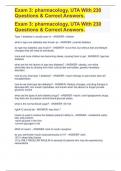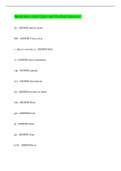Exam 3: pharmacology, UTA With 230
Questions & Correct Answers.
Exam 3: pharmacology, UTA With 230
Questions & Correct Answers.
Type 1 diabetes is usually seen in - ANSWER- children
what is type one diabetes also known as - ANSWER- juvenile diabetes
do type two diabetics use insulin? - ANSWER- not at first, but without diet and lifestyle
changes they will need to eventually.
more and more children are becoming obese, causing them to get - ANSWER- type two
diabetes
what are the risk factors of type two diabetes? - ANSWER- obesity, non-white
ethnicities due to straying from their cultural diet normalities, genetic hereditary
disorders
how do you treat type 1 diabetes? - ANSWER- insulin therapy or pancreatic islet cell
transplantation
how do we treat type two diabetes? - ANSWER- lifestyle changes, oral drug therapy to
decrease BS, non-insulin injectables, and insulin when the above no longer provide
glycemic control
what are the types of anti diabetic drugs? - ANSWER- insulin, oral hypoglycemic drugs.
they both aim to produce normal blood glucose states.
what is the normal blood sugar? - ANSWER- 60-100
hgbA1C should be - ANSWER- less than 7
insulin is used to restore the diabetic patient's ability to - ANSWER- -metabolize carbs,
fats, and proteins
-store glucose in the liver
-convert glycogen to fat
MOA of insulin: - ANSWER- bind to insulin receptors
do you administer insulin subcutaneously or IV? - ANSWER- both.
-SC in deep fatty tissues
-IV is ONLY REGULAR INSULIN in severely ill patients who may be experiencing
ketoacidosis
,Exam 3: pharmacology, UTA With 230
Questions & Correct Answers.
Lispro (Humalog), Aspart (novalog), and Apidra are all what kind of insulin? - ANSWER-
Rapid acting with an onset of 15 minutes and with a peak of 30-90 minutes.
Have food readily avaliable to the patient
-MEALTIME COVERAGE (BASAL BOLUS)
-Sliding scale/correctional
Lispro, Aspart, and Apidra are all - ANSWER- rapid acting, mealtime coverage, basal
bolus insulins. can also be used in sliding scale correctional/supplemental insulin
is regular insulin fast/short acting or slow/long acting? - ANSWER- short & long acting
when drawing up regular insulin and NPH insulin in the same syringe, which do you
draw up FIRST? - ANSWER- Regular
which is the only insulin that can be given IV? - ANSWER- Regular
Lantus (glargine) and Levemir (Detemir) are _____ acting insulins - ANSWER- Long
which insulins cannot be mixed with others in the same syringe? - ANSWER- Long
acting insulins like Levemir and Lantus
NPH is an ______ acting insulin - ANSWER- intermediate
basal insulin is - ANSWER- glargine or levemir
patients taking basal-bolus insulin also must be taking in ____ - ANSWER- calories
when should you hold insulin? - ANSWER- when the patient is hypoglycemic, and blood
sugar is less than 70.
what are the symptoms of hypoglycemia? - ANSWER- hunger, shakiness, dizziness,
confusion, headache, tachycardia, pounding/racing heart, diaphoresis
what do you teach patients who are on insulin and a beta blocker to recognize
symptoms of hypoglycemia? - ANSWER- teach the patient to recognize other
symptoms besides tachycardia and diaphoresis.
how can we prevent hypoglycemia? - ANSWER- eat regularly, carry glucose tabs/candy
mealtime coverage insulins are also called - ANSWER- basal-bolus or basal-prandial
mealtime insulins are ____ or _____ acting insulins - ANSWER- short, rapid
, Exam 3: pharmacology, UTA With 230
Questions & Correct Answers.
between meal coverage, ____ or ____ acting insulin is used - ANSWER- intermediate,
long
sliding scale (correctional/supplemental) insulins are - ANSWER- regular or rapid acting
what are some patient teaching points for diabetes? - ANSWER- -teach the patient how
to administer their own insulin
-how to prevent hypoglycemia and how to treat it
-how to check their blood sugar
how do we treat hypoglycemia - ANSWER- in patients who are awake and alert, orange
juice or milk can be taken, glucose tablets, glucagon IM.
if patient is NPO or unresponsive, IV D50 is given
if the patient is being taught how to administer their own insulin SC, what should the
nurse be sure to teach them? - ANSWER- They must be taught to inject at a 90 degree
angle, never massage or aspirate
repeated episodes of hypoglycemia can lead to - ANSWER- organic brain syndrome
(OBS)
insulin is measured in - ANSWER- units
nurses should check what before administering insulin - ANSWER- blood sugar
should vials be shaken or rolled to mix suspensions? - ANSWER- ROLLED
what kind of syringe should you use for insulin admin? - ANSWER- insulin specific
syringe that measures in units
what are the contraindications of insulin? - ANSWER- specific allergy, hypoglycemia
what can excess insulin induce? - ANSWER- shock, coma, death
what drugs increase blood glucose? - ANSWER- corticosteroids, diuretics, thyroid
hormones
what drugs decrease blood glucose? - ANSWER- alcohol, anabolic steroids, MAOIS
if you notice that your patient has a scheduled nutritional insulin due at 12pm, but they
are NPO, should you hold the insulin? - ANSWER- YES. Npo patients should not be
taking any mealtime/nutritional insulin because they are not taking in calories.
NPO patients can still take ____ insulin and ______. - ANSWER- basal & supplemental





